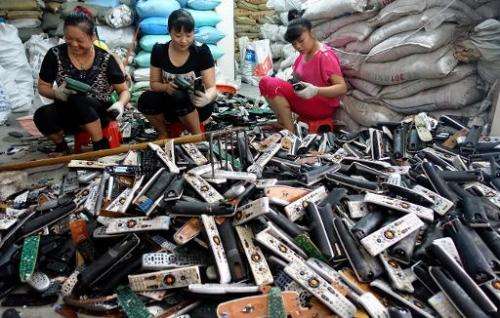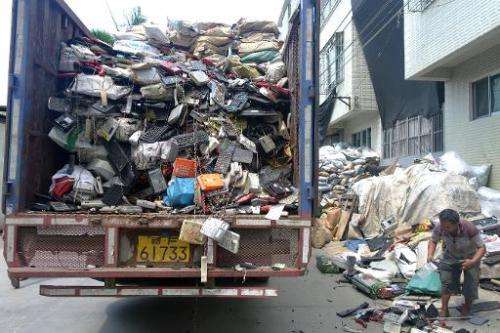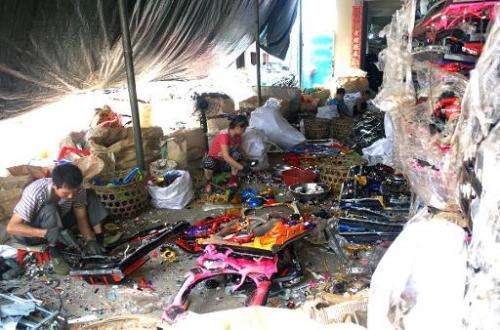E-waste inferno burning brighter in China's recycling capital

Mountains of discarded remote controls litter the warehouse floor. In a dimly-lit room, women on plastic stools pry open the devices, as if shucking oysters, to retrieve the circuitry inside.
In a narrow alley a few blocks over, a father and son from a distant province wash microchips in plastic buckets. Men haul old telephones and computer keyboards by the shovelful off a truck.
Some items will be refurbished and resold, others will be stripped for components or materials such as copper or gold.
Business is booming in the Chinese town of Guiyu, where the world's electronic waste ends up for recycling—and is set to get even better.
But the industry has a heavy environmental cost. Electronic remnants are strewn in a nearby stream, and the air is acrid from the burning of plastic, chemicals and circuitboards.
Heavy metal contamination has turned the air and water toxic, and children have high lead levels in their blood, according to an August study by researchers at Shantou University Medical College.
Much of the e-waste that passed through Guiyu over the past few decades came from outside China.
Western countries are now making a greater effort to process their own e-waste, but Chinese domestic supply will soon be more than enough to step into any breach, campaigners say.
China's surging economy has transformed the country into a consuming power in its own right—it is now the world's largest smartphone market—and use of electronic devices has soared.
"Before, the waste was shipped from other parts of the world coming into China—that used to be the biggest source and the biggest problem," said Ma Jun, director of the Institute of Public and Environmental Affairs, one of China's foremost environmental NGOs.
"But now, China has become a consuming power of its own," Ma said. "We have I think 1.1 billion cell phones used, and the life of our gadgets has become shorter and shorter."
"I think the wave is coming," he added. "It's going to be a bigger problem."

'This cannot be allowed to go on'
China currently generates 6.1 million metric tonnes of e-waste a year, compared with 7.2 million for the US and 48.8 million globally, according to the United Nations University's Solving the E-waste Problem (StEP) Initiative.
But while US e-waste production has increased by 13 percent over the past five years, China's has nearly doubled, setting the Asian giant on track to overtake the US as the world's biggest source as early as 2017.
Nowhere are the profit and environmental toll of e-waste recycling more on display than in Guiyu in the southern province of Guangdong, where some 80,000 of 130,000 residents work in the loosely-regulated industry, according to a 2012 local government estimate.
More than 1.6 million tonnes of e-waste pass through Guiyu each year, with recycling worth 3.7 billion yuan ($600 million) annually and attracting migrants from near and far.
"This work is tiring, but the salary is okay compared with the work in town," said a 30-year-old surnamed Ma, who left a salesman's job to dismantle electronics. "You can make 4,000 or 5,000 yuan ($650 to $815) a month."
At the same time, the town has made worldwide headlines for the devastating health impact of its tainted environment.

"People think this cannot be allowed to go on," said Leo Chen, 28, a financial worker who grew up in Guiyu.
The situation was better than a decade ago, he said, following authorities' interventions, but the effects of years of pollution remain.
"In my memory, in front of my house, there was a river. It was green, and the water was very nice and clear," he said. "Now, it's black."
'Morally complicated'
Lai Yun, a Greenpeace researcher who has often visited Guiyu, said that while Beijing has tightened regulations enforcement is often lax, and the bottom line is that development cannot be obstructed.
"From the government's perspective, e-waste gathering and processing is important for the local economy," Lai said. "Research has shown that 80 percent of households are involved in this work. So, if they don't expand this industry, these residents will need some other kind of employment."
Central authorities including China's powerful National Development and Reform Commission (NDRC) have invested heavily in Guiyu's recycling industry, pointed out Adam Minter, author of "Junkyard Planet", on the economics of the global scrap industry.
The overall picture was mixed, he said.
"There is an environmental good happening there—they're extending the life span of usable components, they're pulling things out and recycling them, or sending them to Korea and Japan, something that's very expensive to do in the US and the EU," he said.
"Yet they do it in a way that's not always good for human health and the environment," he added. "Recycling is a morally complicated act."
© 2014 AFP



















